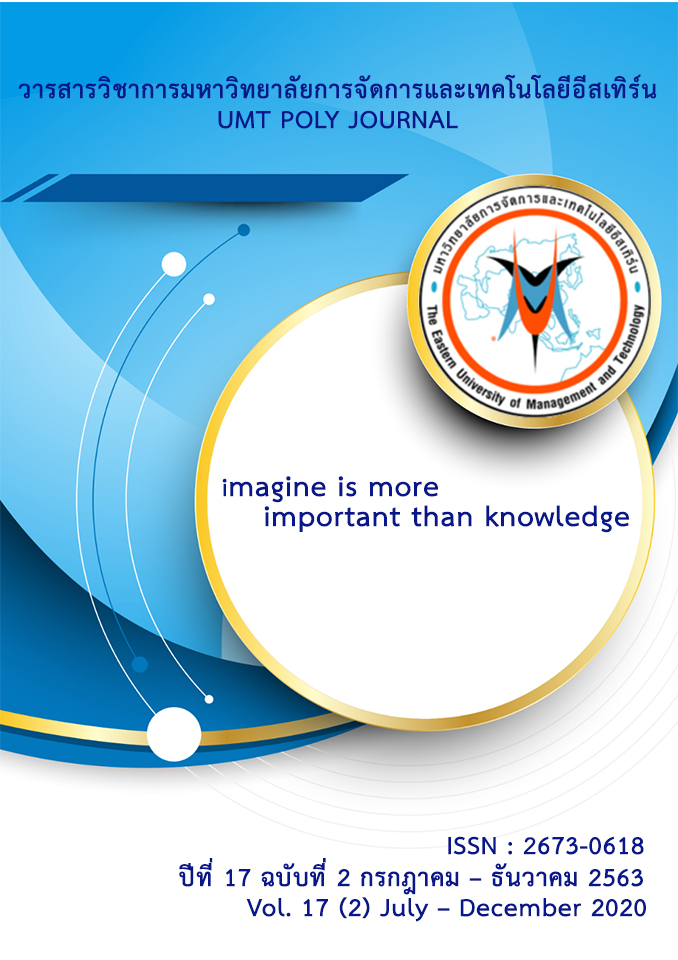The influence of management shareholding on m&a performance - the moderating effect based on managerial overconfidence
คำสำคัญ:
Management shareholding, Managerial overconfidence, M&A performance, Weakening effectบทคัดย่อ
The A-share listed information technology companies in Shanghai and Shenzhen from 2012 to 2016 were selected as the object of study to investigate the effect of management shareholding on M&A performance from a rational perspective. The mechanisms by which managerial overconfidence works on management shareholding and M&A performance were analyzed by integrating rationality and bounded rationality.
The results show that management shareholding is positively correlated with M&A performance, i.e. the growing level of managerial share ownership can improve M&A performance. Moreover, the positive impact of management shareholding on M&A performance will be weakened by managerial overconfidence, i.e. managerial overconfidence has a “weakening effect” on the influence of management shareholding on M&A performance. The findings can be used to guide corporate governance, incentive mechanism and manager appointment in M&A decisions. In addition, most of studies on M&A are based on either rationality assumption or bounded rationality assumption. Our study expands the current theory by integrating both rationality and bounded rationality to investigate the influence of managerial overconfidence on M&A.
Downloads
เอกสารอ้างอิง
Berle,A. A,&Gardiner, C.M. (1932).The Modem Corporation&Private Property.New York: Macmillan.
Demsetz, H. (1983), “The structure of ownership and the theory of the firm”, Journal of Law and Economics, Vol. 26 (2); 375 ‐ 94.
Denis, K.D. & McConnell, J.J. (2003). International corporate governance. Journal of Financial and Quantitative Analysis, 38; 1–36.
Fuxiu, J., Min, Z., &Zhengfei, L. (2009). Managers' overconfidence, corporate expansion and financial distress. Economic research, (1);131-143.
Gary, G., Matthias, K.,& Richard, R. (2005). Eat or Be Eaten: A Theory of Mergers and Merger Waves. Social Science Electronic Publishing, 64(3):1291-1344.
Heaton, J. B. (2002).Managerial Optimism and Corporate Finance. Financial Management, 31(2);33-45.
Jensen, M.C. &Meckling, W.H. (1976). "Theory of the firm: managerial behavior, agency costs and ownership structure." Journal of Financial Economics, 34(3); 305-360.
John, A.,&Doukas, D.P.(2010). Acquisitions, Overconfident Managers and Self-Attribution Bias. European Financial Management, 13(3);531-577.
Kenny, C., Shashikant, J.,& Lam, T.J. (2006). Proteomics profiling of epidermal mucus secretion of a cichlid demonstrating parental care behavior. Proteomics, 6(7);2251-2258.
Linghong, X., Shancun, L., &Wanhua, Q.(2012). The influence of overconfidence of managers on M&A performance -- an analysis and demonstration from the perspective of group decision making. Mathematical statistics and management, (1);126-137.
Morck, R., Shleifer,A.,&Vishny,R.W. (1988). Management Ownership and Market Valuation: An Empirical Analysis. Journal of Financial Economics, 20(1/2); 293-315.
Narayanan, M. P. (1985). Managerial Incentives for Short-Term Results. Journal of Finance, 40(5);1469.
Richard, R. (1986). Hubris Hypothesis of Corporate Takeovers. The Journal of Business, 2 (59); 197-216.
Shanmin, L.,& Tao, Z. (2005). Long-term Performance of China's Listed Companies M & A: Based on the Research of Securities Market. Journal of Sun Yat-sen University (Social Science Edition), (05); + 132 85-91.
Smith, G.,& Swan, P.L. (2008). The road to riches: CEO incentives and firm performance. Available at SSRN, (04);1-46.
Smith, G.,& Swan, P.L.(2008). The Road to Riches: CEO Incentives and Firm Performance. Social Science Electronic Publishing, 56: 217–236.
Tversky&Kahneman. (1974). Judgment under Uncertainty: Heuristics and Biases. Science, 185(4157);17-34.
Wenqiang, C.,&Shenghua, J. (2015). Equity incentive, agency cost and corporate performance -- an analytical framework based on the dual principal-agent problem. Contemporary economic science, (2);106-113.
Xizhen, Z.,& Lin, He. (2014). Correlation between Corporate Governance, Managers' Overconfidence and Corporate M & A Performance. Journal of Xi'an College of Finance and Economics, (3);19-24.
Yu, F.K.,& Bo, Q.(2009) Performance-vested stock options and interest alignment. British Accounting Review, 41(1):0-61.
Zhihua, X., Haoming, D.,&Huimei, Wang. (2017). M&A market timing, management overconfidence and M&A performance. Finance and accounting monthly,793(09);5-10.
ดาวน์โหลด
เผยแพร่แล้ว
ฉบับ
ประเภทบทความ
สัญญาอนุญาต
ประกาศลิขสิทธิ์
เนื้อหาและข้อมูลในบทความที่ลงตีพิมพ์ในวารสารวิชาการมหาวิทยาลัยการจัดการและเทคโนโลยีอีสเทิร์น ถือเป็นข้อคิดเห็นและความรับผิดชอบของผู้เขียนบทความโดยตรง ซึ่งกองบรรณาธิการวารสารไม่จำเป็นต้องเห็นด้วยหรือร่วมรับผิดชอบใด ๆ
บทความ ข้อมูล เนื้อหาหรือรูปภาพ ฯลฯ ที่ได้รับการตีพิมพ์ในวารสารวิชาการมหาวิทยาลัยการจัดการและเทคโนโลยีอีสเทิร์น ถือเป็นลิขสิทธิ์ของวารสารวิชาการมหาวิทยาลัยการจัดการและเทคโนโลยีอีสเทิร์น หากบุคคลหรือหน่วยงานใดต้องการนำข้อมูลทั้งหมดหรือบางส่วนไปเผยแพร่ต่อหรือเพื่อกระทำการใด ๆ จะต้องได้รับอนุญาตเป็นลายลักษณ์อักษรจากวารสารวิชาการมหาวิทยาลัยการจัดการและเทคโนโลยีอีสเทิร์นก่อนเท่านั้น




